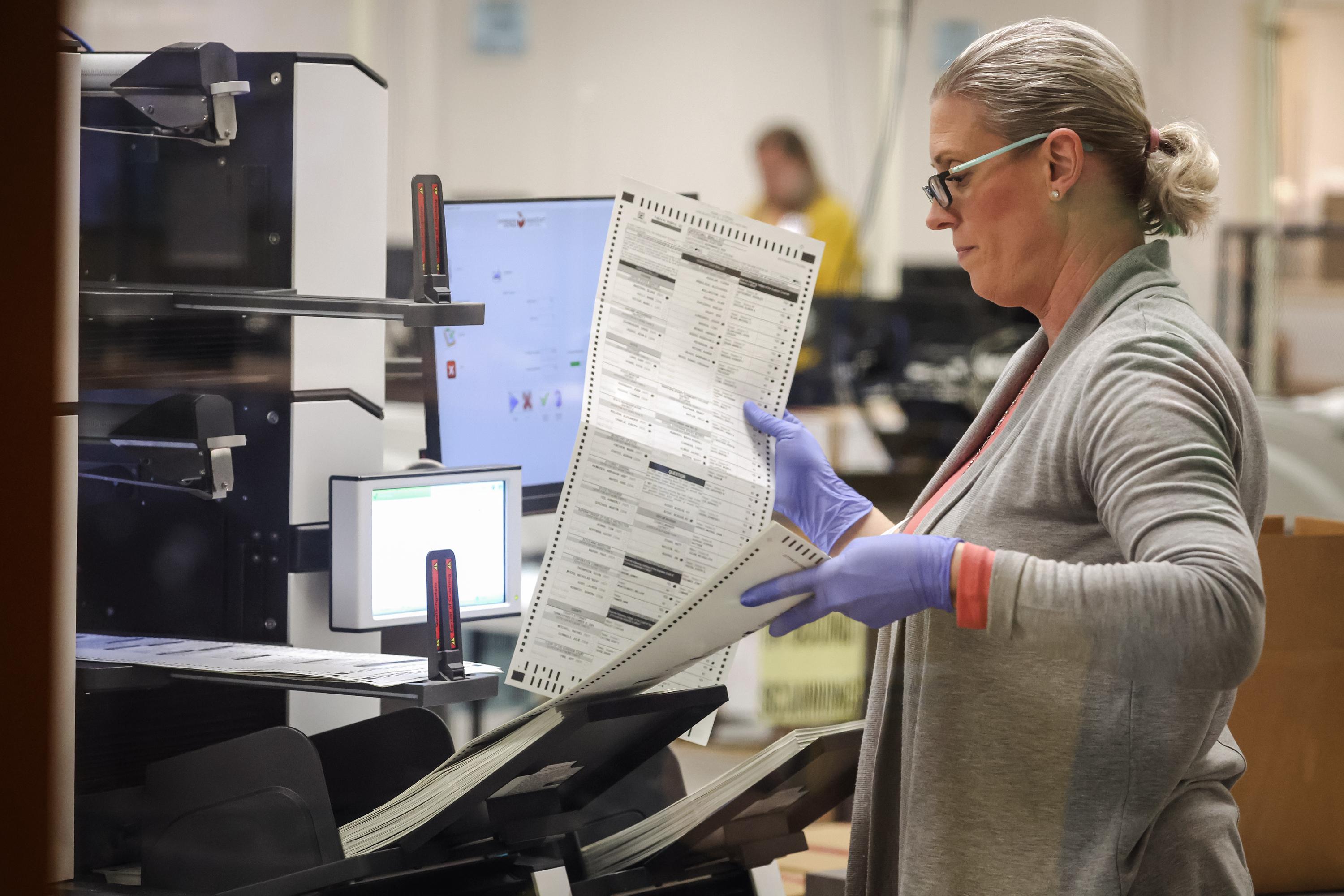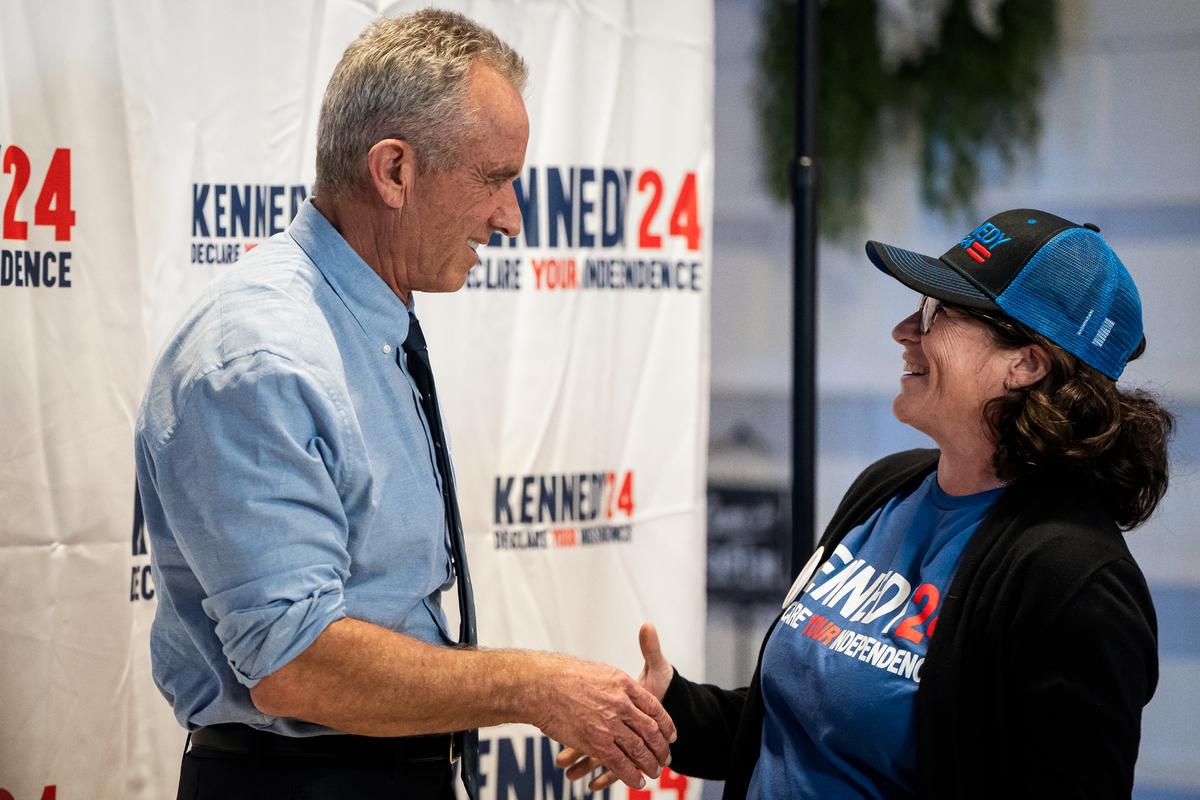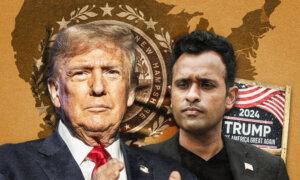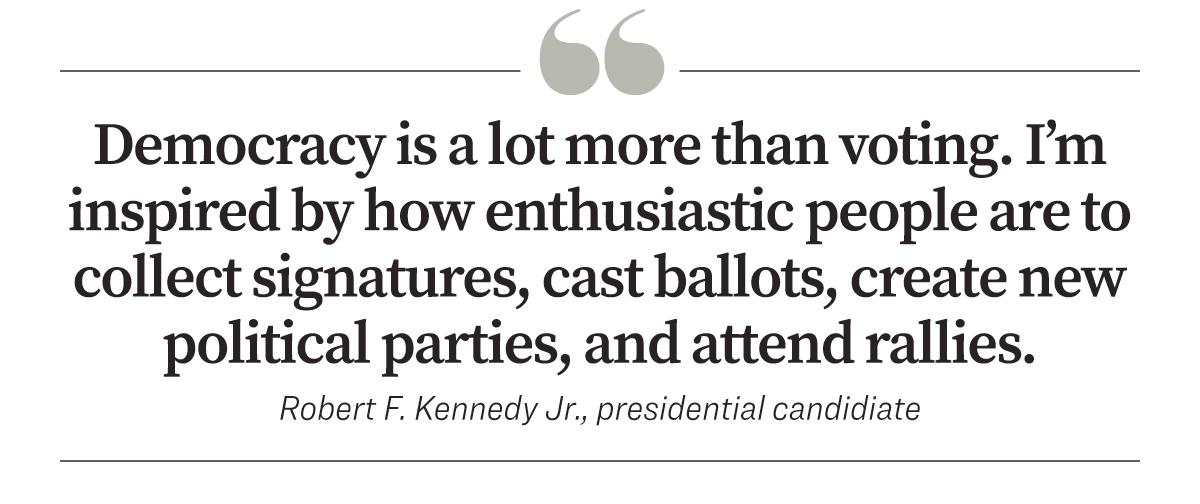To win the 2024 election as an independent, Robert F. Kennedy Jr. is firstly hoping for an outright win, but the second path to victory is to make sure no other candidate wins.
If no candidate reaches 270 electoral votes in a presidential election, the winner is decided by the House of Representatives, where each state gets one vote.
The House has picked the president twice in American history.
In 1800, Aaron Burr and Thomas Jefferson were deadlocked after the electoral votes were counted. The House cast their ballots to elect President Jefferson, who received 61 percent of the popular vote.
The second instance happened in 1824, when none of the four presidential candidates received an electoral vote majority. The House elected John Quincy Adams on Feb. 9, 1825.
“People are starting to realize that Bobby can win, with where he is in the polls,” campaign manager Amaryllis Fox Kennedy told The Epoch Times.
“They are starting to see that, for the first time in their lifetime, the two-party system can be broken and they can vote for somebody who excites them rather than having to vote for the lesser of two evils,” she said. Ms. Kennedy is also the candidate’s daughter-in-law.

The Green Room in the White House in Washington, circa 1962. A portrait of President John Quincy Adams by George P.A. Healy hangs above the fireplace. (Archive Photos/Getty Images)
She said Mr. Kennedy could be considered a preferred candidate over former President Donald Trump and President Joe Biden, the likely Republican and Democrat nominees.
Few independent and third-party candidates, however, have won electoral votes. In 1912, former President Theodore Roosevelt ran as an independent against his former protégé, President William Howard Taft, after failing to win the Republican nomination.
President Roosevelt carried eight states and gained 27 percent of the popular vote but won just 88 electoral votes compared to Democrat Woodrow Wilson’s 435.
Independent candidate and former Alabama Gov. George Wallace won five states in 1968. He needed to prevail in only one more state with 10 or more electors to prevent Richard Nixon from an Electoral College majority.
In 1992, Ross Perot captured around 19 percent of the popular vote, won several counties, and placed second in two states, but he did not secure electoral votes in a race won by Bill Clinton over President George H.W. Bush.
Brian Seitchik, a Republican strategist and former Trump campaign staff member, told The Epoch Times that the strategy to capture enough electoral votes to send the presidential election to the House is “absurd.”
“It was talked about in 1992 when Ross Perot was running. It was talked about when George Wallace was on the ballot many years ago,” Mr. Sietchik said.
“It’s a fantasy that Republican nerds like to talk about—just like they like to talk about a brokered convention. We haven’t had a brokered convention since the 1960s, so these are just sort of political fantasies.”
David Carlucci, a former New York state senator and a Democrat strategist, told The Epoch Times that Mr. Kennedy faces a “daunting challenge” to get electoral votes.
“Regardless of your political affiliation—Democrat, Republican, or Independent—it’s undeniable that the Electoral College poses challenges to an independent candidate. The strategy of winning states necessitates a precise campaign focused on specific demographics, leaving little room for candidates like RFK Jr. to impact safe red and blue states, which constitute the majority,” Mr. Carlucci said
“With fewer than 10 swing states, an independent candidate faces an uphill battle against the targeted efforts of Democrats and Republicans in these crucial areas,” he said.
Mr. Kennedy is traveling the country to private fundraising events and rallies designed to collect signatures to get him on the ballot in all 50 states and the District of Columbia.

Presidential candidate Robert F. Kennedy Jr. announces he is ending his Democratic primary bid and will run for president as an independent, at a press conference in Philadelphia, Pa., on Oct. 9, 2023. (Jessica Kourkounis/Getty Images)
He is on the ballot in Utah, a feat he accomplished earlier this month, and he believes he will get on all ballots.
In five states—California, Delaware, Hawaii, Mississippi, and North Carolina—Mr. Kennedy’s campaign formed the We the People Party. The Texas Independent Party was established in the Lone Star State.
The move was made to get his name on the ballot in those states with fewer voter signatures than is required for candidates not affiliated with a party. It reduced the number of signatures required to gain ballot access by about 330,000, according to a statement by his campaign.
“In some states, party ballot access requires fewer signatures and is therefore the most direct path to ballot access in those states,” the campaign said in a Jan. 16 press release.
Once the new party gains ballot access, it can nominate a candidate.
The challenge of getting on the ballot in every state and the District of Columbia is grueling, time-consuming, and expensive, Mr. Kennedy said. His campaign must collect about 1 million valid pen-and-paper signatures through petitions across the country.
“Effectively, this means closer to 1.5 million to ensure that enough are valid,” Mr. Kennedy said.
Guidelines for securing a ballot spot differ in many states, as do deadlines. North Carolina and Texas, for example, require independent candidates to file by mid-May. Multiple states have summer deadlines.
Some states have varying guidelines about the number of signees in different parts of their state. In multiple states, signatures can be challenged after they’ve been submitted to election offices.
Legal challenges from Democrats and Republicans intent on keeping Mr. Kennedy off the ballot are also possible.

An elections worker scans mail in ballots at the Maricopa County Tabulation and Election Center in Phoenix, Ariz., on Nov. 7, 2022. (Justin Sullivan/Getty Images)
Mr. Kennedy has called ballot access laws for independent and third-party candidates “among the worst forms of voter suppression in America today” and said that state officials should work together to “streamline and standardize ballot access procedures.”
Ballot access restrictions “artificially prop up the two-party duopoly,” Mr. Kennedy said.
American Values 2024, the super PAC supporting Mr. Kennedy, said that it plans to spend more than $10 million to get on the ballot in 10 states—Arizona, California, Colorado, Georgia, Illinois, Indiana, Michigan, Nevada, New York,and Texas.
The super PAC recently announced it had hired three firms to collect voter signatures in Arizona, Georgia, and Michigan.
Mr. Kennedy’s campaign said it won’t hire petitioners and instead continue to rely on its “grassroots army.”
The challenge of collecting signatures to gain ballot access will be “advantageous” because “we’re going to have a better ground game” than other candidates,” Mr. Kennedy said.
At a voter rally in Atlanta on Jan. 14, Mr. Kennedy praised the “grassroots army of more than 50,000” who are working to collect signatures in every state and the District of Columbia.

“Democracy is a lot more than voting. I’m inspired by how enthusiastic people are to collect signatures, cast ballots, create new political parties, and attend rallies,” Mr. Kennedy said in a statement.
“That kind of energy is what will get us onto the ballot in every state and fuel our voter registration and GOTV [get out the vote] operation as we head toward election day.”
His optimism is reflected in polls that show a high favorability rating and approval for him among voters between the ages of 18 and 34.
Mr. Kennedy and Ms. Haley led in the least favorable category at 34 percent compared to 58 percent for President Biden, 57 percent for President Trump, and 52 percent for Mr. DeSantis.
Mr. Kennedy has said multiple times that he believes he will prevail in the general election.
“Right now, polls indicate that I am outperforming both candidates among Americans under 45 years old. I am leading by 10 points among Americans under 35. And in key battleground states, my average stands at an impressive 24 percent, putting me within striking distance of victory,” Mr. Kennedy said in a statement.
“If we can pull 5 percent from each of our opponents to get to 34 percent, we win.”
Original News Source Link – Epoch Times
Running For Office? Conservative Campaign Consulting – Election Day Strategies!





